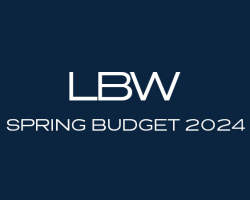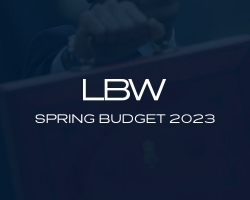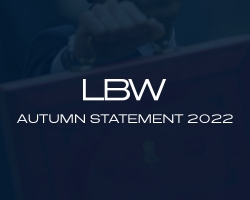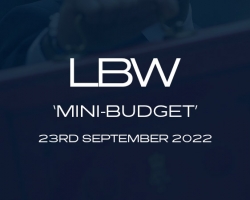Latest News
Budget 2016
George Osborne today delivered his eighth budget, referring throughout that it was a budget for the next generation.
Whilst indicating the economy was still on course for a budget surplus by the end of the current parliament, he did express concern over the condition of the global economy and was not prepared to spend to improve the economy but to target expenditure where it was needed. There was to be a move to improve northern transport links with HS3 from Manchester to Leeds as well as improving the M62 and other cross-pennine projects.
There were the usual increases in excise duty on tobacco but there was a freezing of the duty on fuel (despite comments that the fall in oil price and thus fall in duty collected could result in an increase in the duty rate) as well as beers, cider and spirits (in excess of 22% by volume) to assist our home grown industries whilst other alcohol duties, such as those on wine will rise.
A new levy on sugary drinks is being introduced to tackle an increasing obesity in children. The funds raised will go towards funding sports in schools and extending school hours for such activities. This will come in in 2 years time to provide manufacturers time to change the product formulation and he did comment that some, like Robinsons, have already started the process. There will be two bands of levy and whether or not the increase is passed on to the customer is a matter for the manufacturer concerned.
There were a number of taxation changes announced some of which will come into force with effect from April 2016 whilst others will not start until April 2017 or later. We have selected a number of those changes to comment on reflecting those which we believe will impact our clients as well as indicating the date the changes will come into force from.
Capital Gains Tax
In a surprise move he also announced that, to encourage business, he was to reduce the higher rate of capital gains tax from 28% to 20% and the lower rate from 18% to 10% for those capital gains which are subject to tax at these rates.
He did say however, that there were to be exceptions to this reduction which will include amongst others the tax due on the sale of residential property which does not qualify for principal Private Residence Relief. This exception, the government say is to provide an incentive for individuals to invest in business over property. Landlords it seems are still being targeted.
Business Industry and Employment
In his speech on 8th July 2015 the Chancellor announced that the rate of corporation tax was to reduce from the current level of 20% to 19% and then to 18% by 1st April 2020. He has now gone further to reduce the rate to 17% by 1st April 2020.
In addition for smaller businesses, there will now be an increased starting point for small business rate relief. The current £6,000 rateable value threshold will be increased permanently to £15,000 with effect from April 2017 (so another year at the old rates which will give local government time to adjust their budgets). It is expected that a substantial number of small business will benefit from this and also to hopefully populate empty high street properties as a result.
There were no announcements on capital allowances.
The Chancellors is also aiming to tighten up on tax avoidance schemes and also to ensure multinational companies (for which there has been bad press over the amounts of tax they pay in the UK) pay the amount of tax in the UK based on their UK profits by restricting certain reliefs they claim to more accurately reflect the true level of profitability in the UK. There will also be a tightening up on the VAT rules for overseas internet companies to create a more level playing field with non-internet companies.
It was also announced that the practice of public sector employees using personal service companies is to end. The taxation of personal service companies has often been referred to as IR35. As the government is acting in this manner on individuals they “employ” will this be a prelude to a more hard line approach being taken to other personal service companies.
We have mentioned in the past the taxation of overdrawn loan accounts in limited companies. The current rate of 25% in this instance will rise to 32.5% for company year ends after 6th April 2016 which reflects the increase in the effective rate of higher rate tax on dividends.
Personal Taxes and Pay
There were no changes in the rates of income tax or class 1 National Insurance announced but in his final comments he indicated there would be an accelerated increase in the personal allowance for 2017/18 to £11,500 and further emphasised he was still on course to increase this allowance to £12,500 by 2020 (the end of this parliament).
He has also announced an increase in the threshold at which higher rate tax commences to £45,000 with effect from April 2017. This is, in relative terms, quite an increase from the current level of £42,385 for 2015/16 and the increase to £43,000 for 2016/2017 which had been announced previously.
The Chancellor also confirmed previous rumours that Class 2 Ni, currently paid by the self employed at a rate of £2.08 per week, is to be abolished with effect from April 2018. Currently this class of Ni is the contribution which provides self employed people with their entitlement to state benefits, most notably the state pension. How this contribution requirement will be satisfied in the future is uncertain but there have been suggestions that Class 4 Ni, currently paid as part of the annual tax liability, will be used instead and again suggestions have been made that the rate of Class 4 may rise as a result to align it more closely with Class 1 Ni rates (currently 12%). This is a wait and see situation and as soon as any further announcements are made we will advise accordingly.
Stamp Duty Land Tax
The current system of stamp duty land tax has differing rules and rates depending on whether or not the property in question is residential or commercial/mixed. Residential property is taxed by reference to different rates on different slices of the property value whilst commercial or mixed property is on a single rate depending on the value of the property. This can result in the anomaly of an increase in £1 in the value of commercial property suffering a substantial amount of SDLT. The Chancellor has announced that with immediate effect (today) commercial property will be subject to a regime which is the same as residential property which will reduce SDLT on commercial property. Transitional rules will be available to those who have already exchanged contracts for the purchase of commercial property but have not yet completed.
These rules will also apply to leases which are subject to SDLT.
There is a further update on the announcements made in the November statement as regards the consultation document on the 3% SDLT surcharge on the purchase of additional residential properties. There were suggestions that there may well be exemptions for substantial property owners as well as companies. The relevant press release makes no mention of these exemptions and it specifically includes companies as being amongst those taxpayers who will be impacted by the changes.
Inheritance Tax
There were no announcements on any changes to Inheritance tax.
VAT
There was the usual increase in the VAT registration threshold. The limit is now £83,000. There were no other significant VAT announcements.
Pensions & Savings
Despite rumours to the contrary, the Chancellor announced the tax free lump sum on the commencement of withdrawing of the pension will remain.
ISA limits will also increase to £20,000 per annum.
The Chancellor also introduced a new savings scheme for the under 40’s, the generation it was implied is stuck between saving for property and saving for retirement and announced the introduction of a Lifetime ISA from April 2017. The under 40’s can save up to £4,000 per annum in this type of account until they reach 50 and the government will contribute a 25% bonus. Therefore each year saving the maximum of £4,000 will result in a bonus being added of £1,000. Whilst this can be seen as similar to making a pension contribution, being an ISA the withdrawal will be all tax free as opposed to just 25% of the fund as we currently have with pensions.
Whilst this is not a substantial sum, it should not be dismissed as part of an overall saving strategy for eligible taxpayers as it can all add up over the lifetime of the product and every little helps. Again a push by the government for us all to save for our retirement due to the pressures the government will face with an increasingly aging population.
And finally...
As we have always maintained, with all matters referred to in the Chancellors announcements the “devil will be in the detail” and the full impact and understanding of all the announcements will not be made clear until the full parliamentary process has been undertaken and the proposals become law in the relevant finance act. However, with the current conservative majority it is not expected that there will be any fundamental changes to the proposals other than small tinkering as matters are discussed in the committee stages.
A number of these changes are not expected to come in for at least another 12 months so there will be plenty of time to consider the impact on you and take any necessary action.
We will issue further notices should any matters of significance be announced.
This year we will be holding an informal post budget open forum in our boardroom on Tuesday 22nd March between 9.00am and 11.00am where the team here at LBW will be available to discuss any matters arising from the budget announcements and to answer any questions you may have.
Last modified on




